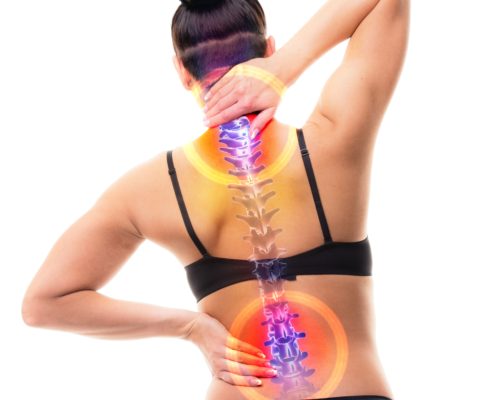Post Laminectomy Syndrome
Failed back syndrome, or post-laminectomy syndrome is a condition characterized by persistent pain following back surgeries. Failed back syndrome (FBS), also called “failed back surgery syndrome” (FBSS), refers to chronic back and/or leg pain that occurs after back (spinal) surgery, usually after laminectomy.
Symptoms of Post-Laminectomy Syndrome
This type of pain is often categorized as a type of chronic pain- nearly 20% of back surgery patients have some sort of pain or discomfort that never goes away. Failed back syndrome can cause a lot of distress and even disability. Some other symptoms of post-laminectomy include:
- Neuropathic pain: The return of the nerve pain that happened during the original spinal injury- sharp, stabbing, or pricking pain
- Radicular pain: Inflammation of the nerve root which causes a shooting pain throughout the nerves
- Leg pain
- Achy and dull pain in the spinal column
Causes of Post-Laminectomy Syndrome
There are a large variety of different causes that may explain why your back continues to hurt long after surgery. The most common causes of failed back syndrome include nerve root compression or a returning disc herniation. Depression, anxiety, smoking, insomnia, and inflammatory mediators releasing can even cause post-surgical back pain. Some other common causes include:

If your symptoms cause an interruption on how you function every day and you can’t complete simple tasks like getting dressed, it is important to seek medical help and work on a treatment plan to alleviate the pain.
- Diabetes
- Scar tissue build-up
- Spinal instability
- Autoimmune disorders
- Joint hypermobility
- Facet joint problems
It is important not to smoke after back surgery, or any surgery. There is a large association between back pain and cigarette smoking and all other types of chronic pain syndromes. In many studies, nicotine has been found to interfere with bone metabolism, and can also lead to the buildup of scar tissue by constricting blood vessel diameters.
Diagnosis and treatment of post-laminectomy syndrome: Correctly diagnosing failed back syndrome can be tricky- it shares many of the same symptoms that other disorders do. Determining the main source of your pain is crucial to a successful treatment.
Your diagnosis will come after a number of steps have been completed
- A thorough evaluation by your doctor, including medical and surgical history
- Analysis of your symptoms and how they affect your daily life
- Certain tests such as X-rays, MRI and/or CT scan, and electrodiagnosis (EMG)- these tests give your doctor a better look at the potential cause and will pinpoint the pain source
Chronic back pain can be miserable for those who suffer daily with it. It can make what’s deemed as a simple task impossible, and normal daily chores can take hours. It can be difficult to sit, stand, or continue working. Finding the source of your pain will lead to a treatment plan, and luckily there are many ways to help you with pain management. Some of these treatments include:
- Basic treatments such as physical therapy and specialized exercises, along with NSAID’s (nonsteroidal anti-inflammatory drugs).
- Spinal cord stimulation: an implanted device that sends mild electrical pulses throughout the spinal cord
- Epidural nerve block: medication directly injected into the spine to decrease inflammation and pain
- Facet joint injections: relieves inflammation and pain derived from the affected joint
- Radiofrequency neurotomy: thermal denervation used to decrease pain that’s caused by facet joints
There are procedures that can be done to help you take back your life and live it better every day, it will just take time and patience.
What Our Patients are Saying
Dr. Muhammad was professional, knowledgeable and seemed to genuinely care about finding a solution to my pain problem.
Dr. Rasheed has been a wonderful doctor so far. He’s very professional and confident. He has had a ton if ideas for us to try, which is completely different from my last pain mgt. doc. So far, he’s been everything I could have asked in a pain mgt. doctor.
I love Dr. Abdelfattah! He is an amazing doctor. He has an excellent beside manner, and her Is very interested and concerned about his patients, and their diagnosis, and he is able to empathize with his patients. He is very skilled at preforming minimally invasive procedures that can really reduce pain. He is NOT a pill mill, but he is NOT scared to prescribe what the patient may need to be comfortable and to reduce pain. As far as I can tell the Pain Management Clinic is in full compliance with the State medical board’s guidelines on Pain Management Clinics. I would send anyone who is seeking relief from their pain to him because he is going to do his very best to find out what is causing the pain, and the best way to treat it. Truly an AWESOME doctor!!! I nominate him as a TOP DOCTOR!!! Being a healthcare professional I know a good physician when I see one and this one is it!!!!
Staff was amazing, tell you what they think and give you options and really wants to know the underlined cause before they do anything. I think that’s awesome and will recommend to anyone!!!
Everyone was so nice. Dr. Zhao explained things to me in a way I could understand everything. She had a smile on her face the whole time. It was like she was happy to see me. I really liked how the appointment turned out.
Dr. Syed listens to me & gives me hope for conquering this constant pain of neuropathy. He is open to new methods of treating my constant pain.
Super place, super doctors. Took the time to explain everything to me.


